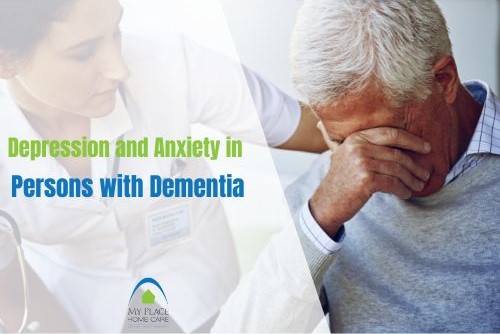
Persons with Dementia, Depression and Anxiety
Overview
Depression and anxiety symptoms are extremely common in persons with dementia and mild cognitive impairment (MCI). As a result of these symptoms, many people with dementia experience a decrease in their quality of life. Depression and anxiety may lead to disengagement from daily activities, which may further exacerbate memory difficulties.
Why is depression common amongst persons with Dementia?
Generally, the causes of depression are similar to those without dementia. However, if a person is in the early stages of dementia begins to experience depression, it may be directly linked to them worrying about their memory and future. In fact, persons diagnosed with vascular dementia or other forms of dementia associated with Parkinson’s and Huntington’s disease are 30% and 40% more likely to experience depression respectively. This is because people with vascular dementia and other forms of dementia associated with Parkinson’s and Huntington’s disease often have more insight and awareness of their condition than persons with Alzheimer’s disease.
Symptoms of Depression
Depression and its symptoms can vary from person to person. Common symptoms include:
- Feeling sad, hopeless, or irritable for much of the time.
- Loss of interest or pleasure in activities they once enjoyed,
- Feelings of worthlessness, guilt or have low self-confidence.
- Experience disturbed sleep, such as waking in the very early morning.
- Struggle to think clearly or concentrate or may become more forgetful.
Those with depression who are older in age may have slightly different symptoms than younger people. They are likely to feel more agitated and to have more health anxiety (worries about their own health). Physical symptoms such as aches and pains are also more likely.
Depression can drain a person’s energy and make them feel hopeless. It can even make them contemplate self harm. This is why it is very important to take depression seriously and should not just be dismissed as a person just feeling a bit down.
As well as having negative feelings, if a person with dementia has depression, it can make problems with their thinking and memory worse. Depression may also cause any changes in their behaviour worse. They may be agitated and aggressive and they may have problems sleeping or refusing to eat. For people in later stages of dementia, symptoms of depression often include tearfulness and weight loss.
Why is anxiety common amongst persons with Dementia?
It is common for people with dementia to have anxiety. It can make symptoms of dementia worse – particularly symptoms that affect a person’s attention, planning, organising, and decision making. Like the majority of people who experience anxiety, those with dementia experience anxiety caused by the fear or thought that something bad is about to happen. When someone experiences anxiety they may experience physical symptoms such as higher blood pressure, increased heart rate, and perspiration. A person with anxiety can find it very difficult to stop thinking and feeling that something bad is about to happen and it can have a serious impact on their everyday life. Anxiety seems to be more common in people with dementia who still have good insight and awareness of their condition. It can be particularly common in people with vascular or frontotemporal dementia and is less common in persons with Alzheimer’s.
Symptoms of Anxiety
People with dementia who have anxiety may have a range of psychological symptoms. In addition to feeling anxious, they may feel tired, uneasy, irritable, and struggle to concentrate. They may also experience physical symptoms such as fast or irregular heartbeats (palpitations), shortness of breath, dizziness, nausea, or diarrhoea. Someone with anxiety may also have changes in their behaviour, such as becoming agitated or hoarding. They may constantly ask for reassurance and not want to be left alone or they may closely follow a carer or family member around. They could also become restless and pace or fidget.
How can you help your loved one?
There are many ways to help your loved one if they experience anxiety and depression including seeking medical or professional help, establishing routines, engaging them in activities, altering their surroundings and more. If you recognize some of these symptoms and you may feel that a visit to the doctor is the best course of action for your loved one. If some symptoms of depression are prominent, the following tips may help:
- Help them establish a daily routine they find reassuring.
- Engage them in regular physical activity, such as walking, cycling, tai chi, or pilates.
- Doing regular activities with other people – social isolation can make depression worse.
- Reminiscing and life story activities, such as making a scrap book or photo albums about their life.
- Having more one-on-one interactions with another person – some people enjoy talking, holding hands, or gentle massage.
- Changes to their environment – for example, reducing bright lights and loud noises or avoiding large groups of people.
If some of the minor symptoms of anxiety are prominent, the following tips can help:
- Talk about their worries or fears
- If something very upsetting or traumatic has happened recently or in the past. The person may find it helpful to talk about their feelings. However, if it was severe emotional trauma or they are not comfortable talking to a loved one about their worries and fears, seeking professional help is an excellent option.
- Stay active
- Engaging in physical activity can reduce feelings of anxiety and sleeping problems. Participating in group activities can also help reduce anxious feelings, like dancing or singing.
- Encourage your loved one to go outdoors and spend time in natural environments.
- Maintain a healthy diet
- Encourage your loved one to eat a wide range of healthy foods and reduce the amount of alcohol or caffeinated beverages. An unhealthy diet can contribute to feelings of anxiety.
If these tips are not helpful or you feel more can be done, consult your loved one’s physician. Together with their physician, you can all decide the best course of action to help your loved one live their best life.

